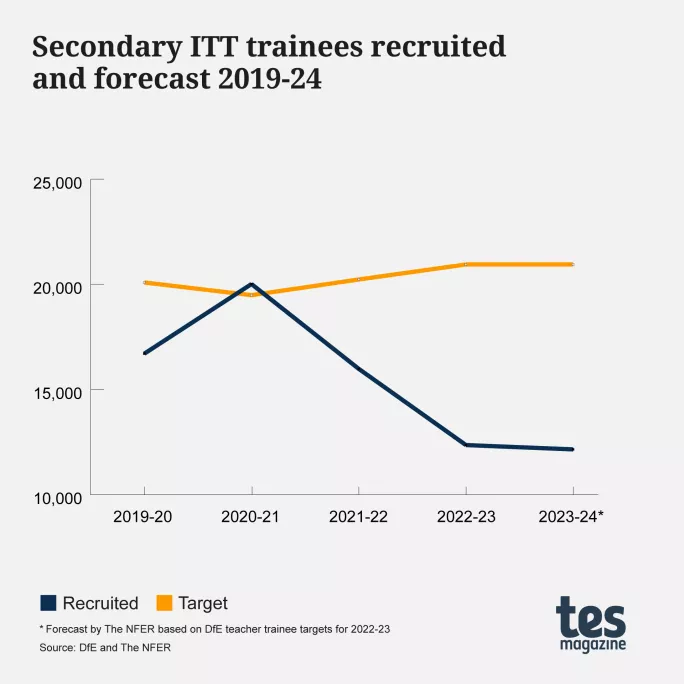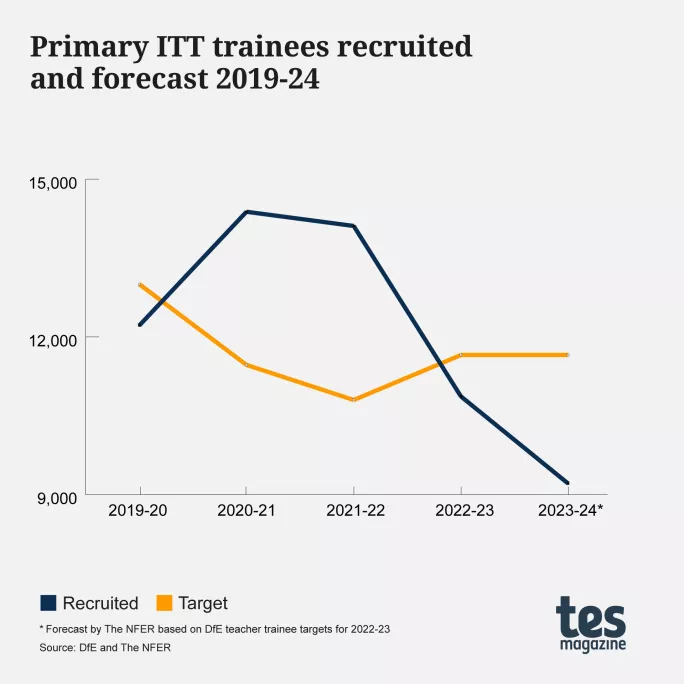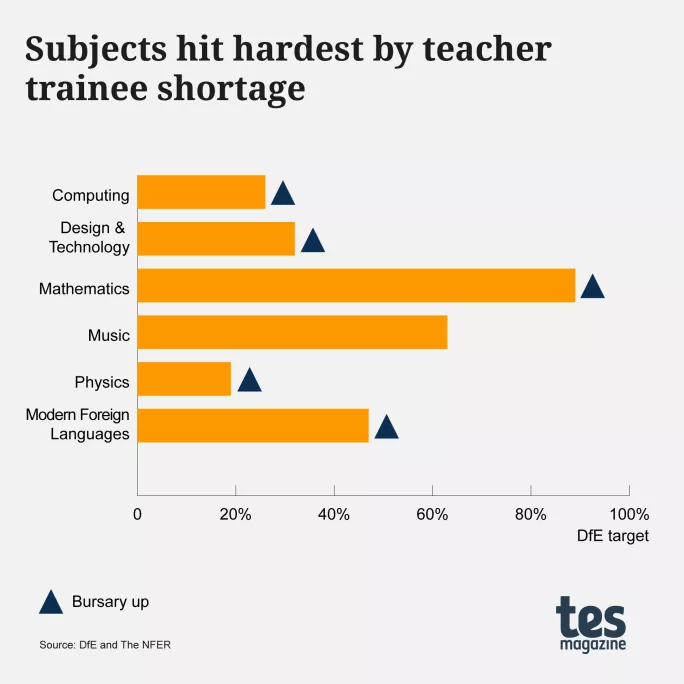
Recruitment crisis: DfE set to miss 2023-24 targets

The government is set to miss its teacher trainee recruitment target for the second year in a row, despite a hike in bursaries, according to an expert forecast published today.
Despite bursary rises for a number of secondary subjects, the National Foundation for Educational Research has estimated that the Department for Education’s initial teacher trainee recruitment target for secondary teachers could be missed by 42 per cent this year.
The NFER warned that addressing the crisis should be “an urgent policy priority” after revealing its forecast for next year’s trainee numbers this morning.
It added that the lack of a “clear strategy” means schools are being “forced to stumble from budget to budget and strike to strike”, and said the DfE should offer a pay rise “that exceeds 4.1 per cent” for teachers next year to address the crisis.
- ITT: Teaching applications even lower than last year
- Teacher training: The “catastrophic” drop in teacher trainee numbers
- Teacher shortage: “Bizarre” ITT plan won’t help teacher shortage, experts warn

Meanwhile, the DfE primary teacher trainee recruitment target is set to be missed by more than a fifth (21 per cent), according to the NFER labour market report.

The report comes after last year’s teacher trainee recruitment data, showing a big drop across most subjects, was described as “catastrophic” by heads’ leaders.
The report adds that “narrowing the gap between teachers’ pay and the wider labour market is key to supporting recruitment and retention”.
The NFER says nine out of 17 secondary subjects - physics, computing, design and technology, business studies, modern foreign languages, religious education, music, drama and art and design - are expected to be 20 per cent or more below the DfE targets set in 2022-23.
It adds that other subjects such as maths, English, chemistry and geography could also be at risk of under-recruiting this year.

Last year the government failed to meet its ITT recruitment targets, with just 59 per cent of the target for secondary teacher trainee entrants starting courses.
This year it has introduced higher training bursaries in many subjects, which seem to be having an impact on recruitment in those subjects, but the NFER says the change is “unlikely to stimulate enough new recruitment this year to meet targets”.
For example, the NFER estimates that less than a fifth (19 per cent) of the physics teacher trainees required to meet the target will be recruited, while it forecasts modern foreign languages recruitment will miss its target by 53 per cent.
And today’s report also claims that the DfE 2023 pay award - which the government has recommended sits at a 3 per cent rise on average - is likely to have “minimal impacts on improving recruitment and retention, relative to the scale of the challenge”.
The report says that in order to “narrow the gap” between teacher pay and pay in the wider labour market, the 2023 pay award should exceed 4.1 per cent.
The NFER recommends that the government should “develop a long-term strategy for improving the competitiveness of teacher pay relative to other occupations” but stresses the importance of “ensuring that schools have sufficient funding to enact these pay increases without making cuts elsewhere”.
Jack Worth, NFER school workforce lead and co-author of the report, said: “Schools are being forced to stumble from budget to budget and strike to strike without the help of a clear strategy designed to address a worsening recruitment and retention crisis.”
Teacher vacancies up
The number of teacher vacancies posted by schools - an indicator of staff turnover - was 93 per cent higher in the academic year up to February 2023 than at the same point in the year before the pandemic, according to the report.
Using data collected by TeachVac, a teacher job board and data scraping service, NFER reveals that in February 2023 teacher vacancies were also 37 per cent higher than in 2021-22.
By the end of the 2021-22 academic year, schools had posted a total of 81,468 job vacancies for teachers, which was 59 per cent higher than in 2018-19, the last year before the pandemic.
This week figures collected by SchoolDash and analysed by Tes revealed that the biggest proportional rises in teacher vacancies are being seen in schools in the North West and South West.
Opportunities for home working ‘very limited’
The report also highlights that the “lack of availability of home working” in the sector “could represent a threat to the relative attractiveness of teaching”.
It recommends that the government should fund further research to better understand teachers’ flexible working preferences and use the findings to revisit the 2019 Teacher Recruitment and Retention Strategy.
Crisis in teaching is ‘entrenched’
Responding to today’s report, Niamh Sweeney, deputy general secretary of the NEU teaching union, said: “The latest NFER report shows what many of us in the education sector have long feared about the state of teacher recruitment and retention: this crisis is entrenched, and it cuts deep and hard.
“Year after year this government has failed to truly recognise the scale and severity of the issue.”
And Geoff Barton, general secretary of the Association of School and College Leaders (ASCL), said that teacher shortages have been “a problem for many years, but the situation has sunk to a new low in the wake of the pandemic”.
Meanwhile, Russell Hobby, CEO of Teach First, said the report “paints a worrying picture”, and called for “an uplift in starting pay, with additional pay premiums for teachers in the poorest areas”.
The report comes in the same week that the Commons Education Select Committee launched an inquiry into teacher recruitment and retention.
A Department for Education spokesperson said last Friday: “The government and the education trade unions, Association of School and College Leaders, National Association of Head Teachers, NASUWT and National Education Union, have agreed to move into a period of intensive talks. The talks will focus on teacher pay, conditions and workload reduction.
“In order for talks to begin and, we hope, reach a successful conclusion, the NEU has confirmed it will create a period of calm for two weeks during which time they have said no further strike dates will be announced. The education secretary and all unions will meet today [Friday 17 March], beginning intensive talks, which will continue over the weekend.”
You need a Tes subscription to read this article
Subscribe now to read this article and get other subscriber-only content:
- Unlimited access to all Tes magazine content
- Exclusive subscriber-only stories
- Award-winning email newsletters
- Unlimited access to all Tes magazine content
- Exclusive subscriber-only stories
- Award-winning email newsletters
You need a subscription to read this article
Subscribe now to read this article and get other subscriber-only content, including:
- Unlimited access to all Tes magazine content
- Exclusive subscriber-only stories
- Award-winning email newsletters
- Unlimited access to all Tes magazine content
- Exclusive subscriber-only stories
- Award-winning email newsletters
topics in this article



